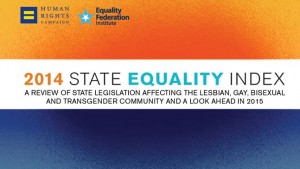WASHINGTON — The Human Rights Campaign (HRC) in partnership with the Equality Federation, has released its first national report assessing the status of state legislation affecting LGBT equality across America, including in California.
 The inaugural State Equality Index (SEI) reveals that, even with progress on marriage equality, there are extraordinary state-to-state disparities in LGBT non-discrimination protections, including in the workplace, and efforts continue by equality opponents to pass state-level legislation that would sanction discrimination and undermine even minimal existing protections.
The inaugural State Equality Index (SEI) reveals that, even with progress on marriage equality, there are extraordinary state-to-state disparities in LGBT non-discrimination protections, including in the workplace, and efforts continue by equality opponents to pass state-level legislation that would sanction discrimination and undermine even minimal existing protections.
California is one of 18 states in the country that has explicit state-level workplace protections for all LGBT employees. It is also one of 36 states with marriage equality.
“Despite historic progress on issues like marriage equality, a majority of states still struggle to reach even a basic level of equality for LGBT people,” said HRC President Chad Griffin. “Most states lack statewide non-discrimination laws to protect LGBT people – putting countless individuals and families at risk, and creating inequalities in adoption and surrogacy, employments benefits, and youth safety and well-being.”
“Even worse,” Griffin said, “equality opponents continue to push deeply harmful laws forward, including those seeking to undermine critical protections in the guise of ‘religious liberty.'”
Though same-sex marriage is legal in 36 states and Washington, D.C., more than 111 million people, or 35 percent of Americans, live in states that have marriage but where LGBT people are not fully protected from discrimination in the workplace. And more than 206 million people nationwide live in states where every LGBT person lacks fully-inclusive statewide workplace sexual orientation and gender identity protections.
While California has among the most comprehensive protections for LGBT people in the country, work continues to fully implement access to transgender healthcare for its residents and safe schools for LGBT students.
The SEI assesses states on their LGBT-related legislation and policies, good and bad, in six areas: relationship recognition, parenting laws and policies, non-discrimination laws, hate crimes laws, anti-bullying laws, and health and safety laws and policies. Based on that review, the SEI assigns states to one of four distinct categories.
California falls into the highest-performing category “Working Toward Innovative Equality.”
Seven states and the District of Columbia are in the highest category, “Working Toward Innovative Equality”
These states have marriage equality, robust LGBT non-discrimination laws that include employment, housing and public accommodations as well as protections in the realm of credit, insurance, and jury selection. Most allow transgender people to change official documents to reflect their gender identity. Many bar private insurers from banning transition-related healthcare. LGBT youth are protected by anti-bullying laws, as well as innovative measures in some states that address conversion therapy, inclusive juvenile justice policies, homelessness, and sexual education.
Seven states are in the category “Solidifying Equality”
These states have marriage equality and non-discrimination protections, and are considered high-performing but not cutting edge on LGBT equality. Some states, however, lack explicit non-discrimination protections on the basis of gender identity. These states have relatively robust anti-bullying laws, but bad laws begin to crop up in this category.
Seven states are in the category “Building Equality”
These have marriage equality and have taken steps toward more robust LGBT equality, including passing basic non-discrimination and hate crimes laws. Some lack explicit gender identity protections, and several lack comprehensive anti-bullying laws. Bad laws are more common, so advocates work to stop bills that undermine LGBT equality, and pass more comprehensive non-discrimination laws.
Twenty-nine states are in the worst-performing category “High Priority to Achieve Basic Equality”
Most of these states have many laws that undermine LGBT equality, from those that criminalize HIV and sodomy, to measures allowing religious-based discrimination against LGBT people. A handful of states have court-ordered marriage equality; none have non-discrimination laws that include sexual orientation or gender identity protections; few have hate crime laws. LGBT advocates largely work on killing bad bills, and on passing municipal protections for LGBT people.
“With 107 pro-equality laws passed in the last 10 years – many of them sponsored by Equality California – we are proud and gratified that California is the state with the strongest civil rights laws for LGBT people,” said Rick Zbur, Equality California Executive Director. “But despite our steady progress and national leadership, all is not golden in the Golden State. Our community faces startling health and wellness disparities, including disproportionate rates of poverty, suicide, homelessness, violence and lack of insurance. And as the State Equality Index points out, critical LGBT health data is not being collected in California and LGBT people are not being counted in other ways either. So while we celebrate California’s clear leadership, we also recommit ourselves to the considerable work that remains to be done.”
The full report, including detailed scorecards for every state, is available online at www.hrc.org/sei. The Equality Federation on January 26 will launch a week-long educational campaign to bring attention to state disparities in LGBT protections.











